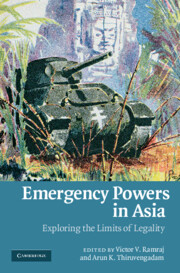Book contents
- Frontmatter
- Contents
- List of contributors
- Preface
- 1 Introduction: emergency powers and constitutionalism in Asia
- PART I Perspectives from legal and political theory
- PART II Postcolonial and post-conflict transitions
- 6 From Myanmar to Manila: a brief study of emergency powers in Southeast Asia
- 7 Discourses of emergency in colonial and postcolonial Burma
- 8 Emergency and Islamic law in Aceh
- 9 UNaccountable? The United Nations, emergency powers and the rule of law in Asia
- PART III Emergencies, executive power and constitutional order
- PART IV The role of the courts
- Index
- References
9 - UNaccountable? The United Nations, emergency powers and the rule of law in Asia
from PART II - Postcolonial and post-conflict transitions
Published online by Cambridge University Press: 04 August 2010
- Frontmatter
- Contents
- List of contributors
- Preface
- 1 Introduction: emergency powers and constitutionalism in Asia
- PART I Perspectives from legal and political theory
- PART II Postcolonial and post-conflict transitions
- 6 From Myanmar to Manila: a brief study of emergency powers in Southeast Asia
- 7 Discourses of emergency in colonial and postcolonial Burma
- 8 Emergency and Islamic law in Aceh
- 9 UNaccountable? The United Nations, emergency powers and the rule of law in Asia
- PART III Emergencies, executive power and constitutional order
- PART IV The role of the courts
- Index
- References
Summary
Above all we must remember that the ways of Orientals are not our ways, nor their thoughts our thoughts. Often when we think them backward and stupid, they think us meddlesome and absurd. The loom of time moves slowly with them, and they care not for high pressure and the roaring of the wheels. Our system may be good for us; but it is neither equally, nor altogether good for them. Satan found it better to reign in hell than to serve in heaven; and the normal Asiatic would sooner be misgoverned by Asiatics than well governed by Europeans.
Lord Curzon, 1889In 1952 a committee of the American Society of International Law considered whether the laws of war should apply to United Nations enforcement actions. After struggling with the question, they noted that the UN held a ‘a superior legal and moral position’ to the states which are parties to the relevant conventions and concluded that the Organisation should ‘select such of the laws of war as may seem to fit its purposes’. This conferred extraordinary latitude upon the United Nations, which at the time consisted of only sixty countries. Since that time the membership of the UN has more than tripled and the Organisation itself has affirmed – though only in 1999 – that international humanitarian law does indeed apply to peacekeeping and other operations.
- Type
- Chapter
- Information
- Emergency Powers in AsiaExploring the Limits of Legality, pp. 237 - 264Publisher: Cambridge University PressPrint publication year: 2009
References
- 2
- Cited by



